We don’t see things as they are, we see them as we are. Anais Nin
After 10 years of loving and living with my wife, one thing stands out: our perspectives on many things differ. And that does not mean either of us is wrong; it’s just where we are standing viewing the same thing. Viewing the same object or discussing the same issue from different positions or insights will give different views and opinions- same picture, different interpretation!
We all have our telescopes through which we view life and this may limit our perspective and opinions on many things. Conscious effort must be made to see and experience life beyond your defined telescope. For about ten years, I had this unproven belief and perspective that it was only Africans and other ethnic minorities living in the United Kingdom that believed in God and attended church services regularly. This belief was spurred mostly by the view of the fact that Britain is actually gradually becoming a secular state.
Many members of ethnic minority groups I knew almost bragged about being just about the few left in Britain who still go to church or practise Christianity (in hindsight, I see it as ‘spiritual arrogance’). All this happens when we limit our life telescopes.
Now, I know better! After leaving my comfort zone and discarding my former telescope, I could see how limited I was in my view and perspective, more like ashamed of myself! This relates to every areas of life. There is need to consciously explore, educate and expose yourself to the world beyond what you can see or experience.
The way I handle some things now is totally different from the way I handled them five years ago. Why? My telescope has been broadened in scope and coverage. I made it a duty to be exposed beyond my limit or comfort zone in order to upstage my default perspectives. You will only always see at your level, not beyond, except you are willing to stand beyond and above your level.
Your perspective is not universal. It is a combination of your experiences, beliefs, and where and who you are. It is true, ‘we don’t see things as they are, we see them as we are.’

